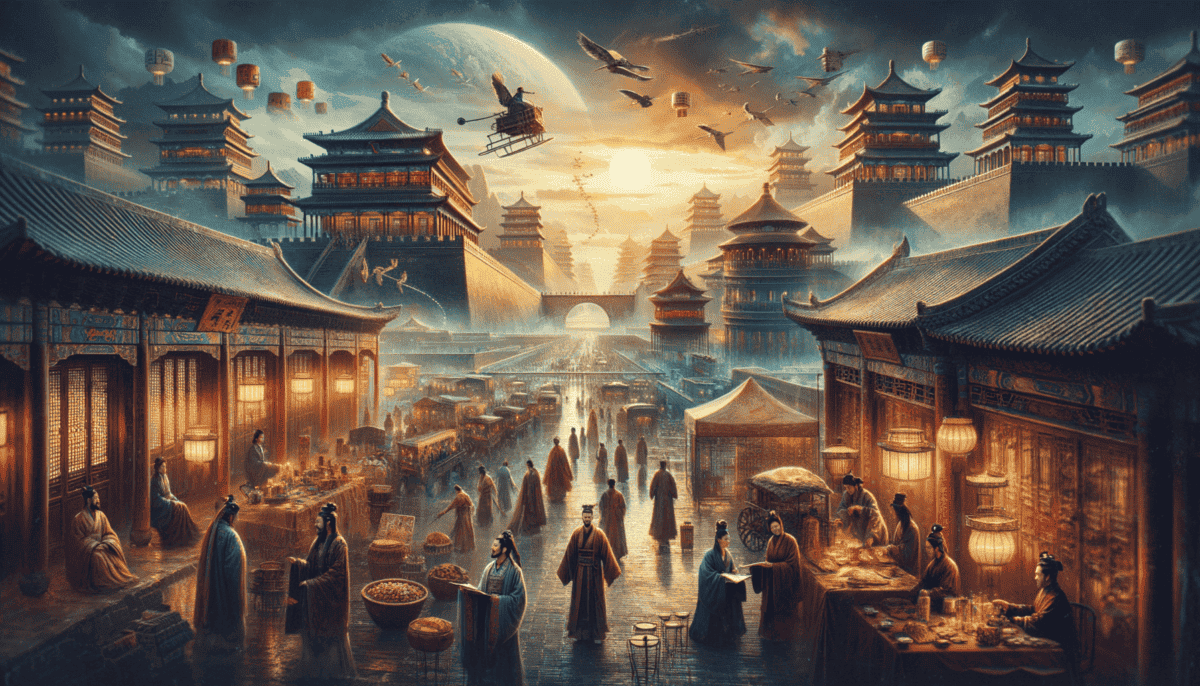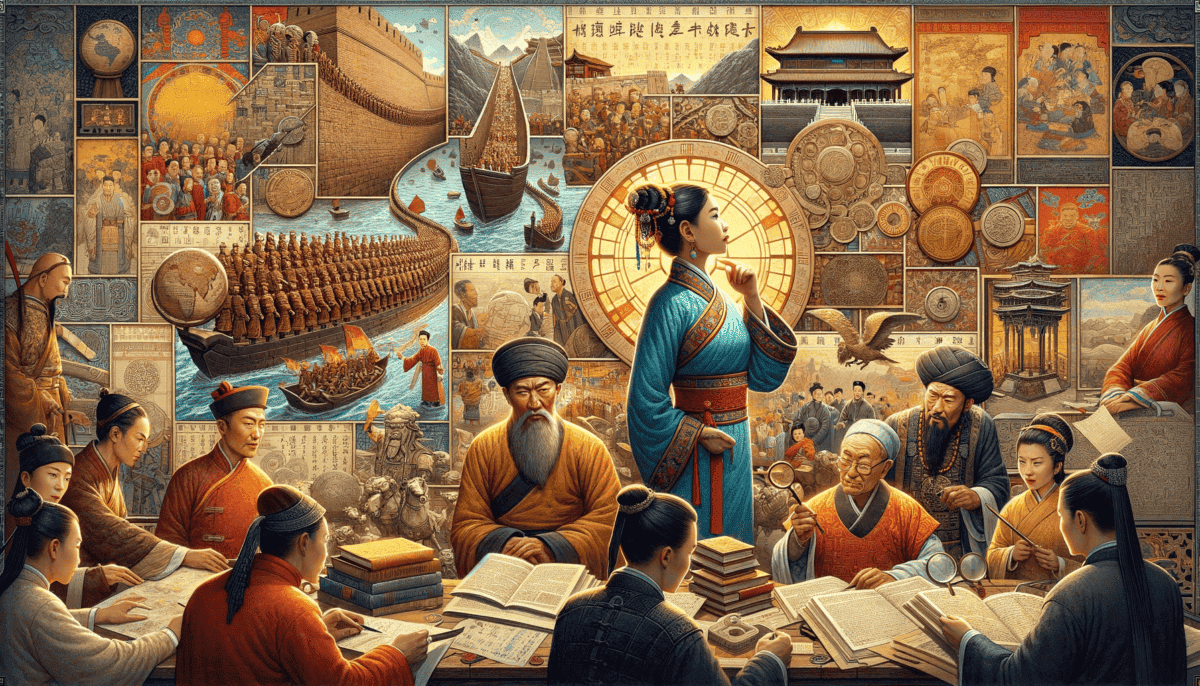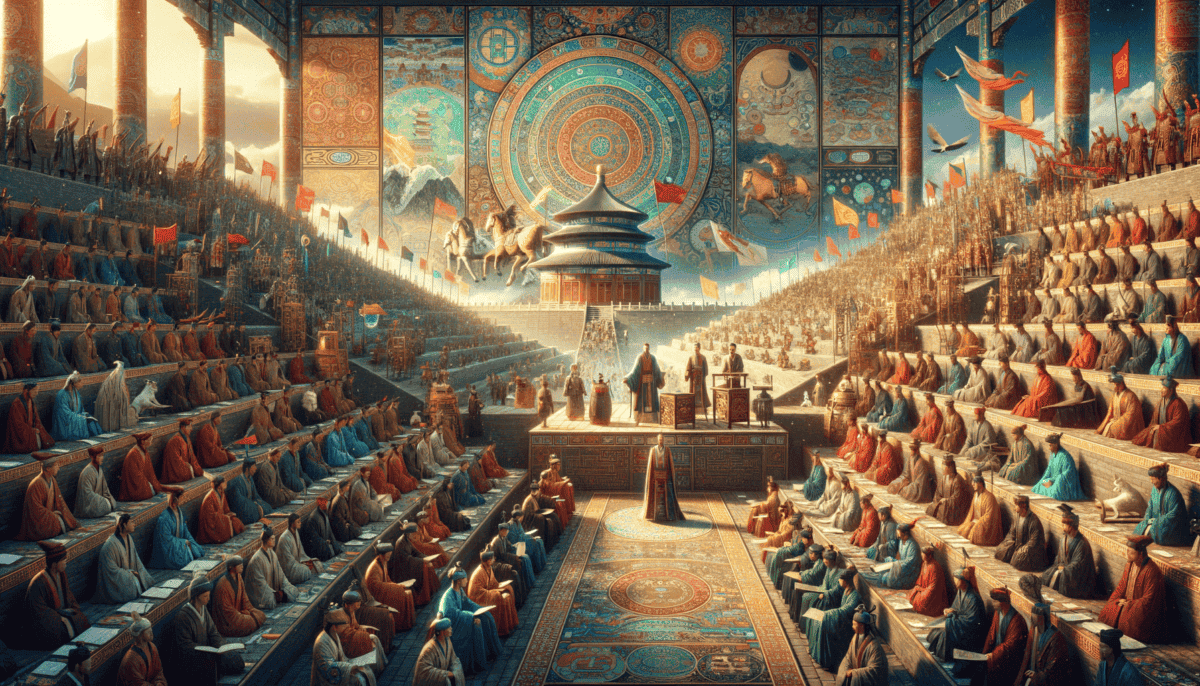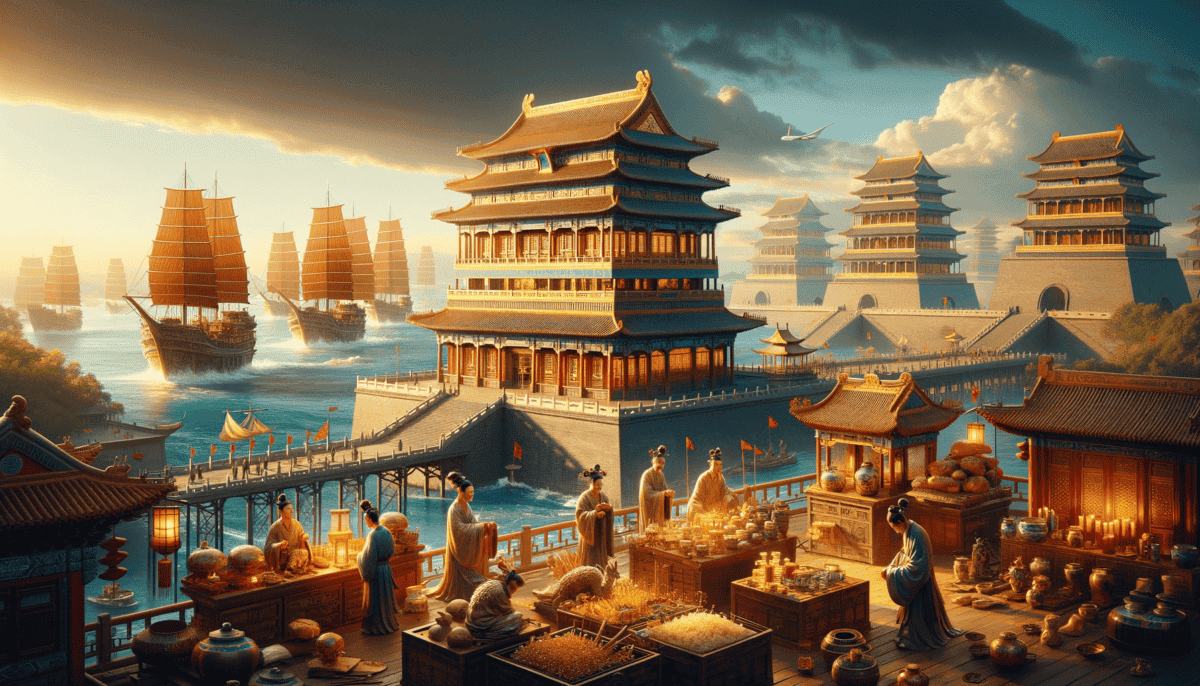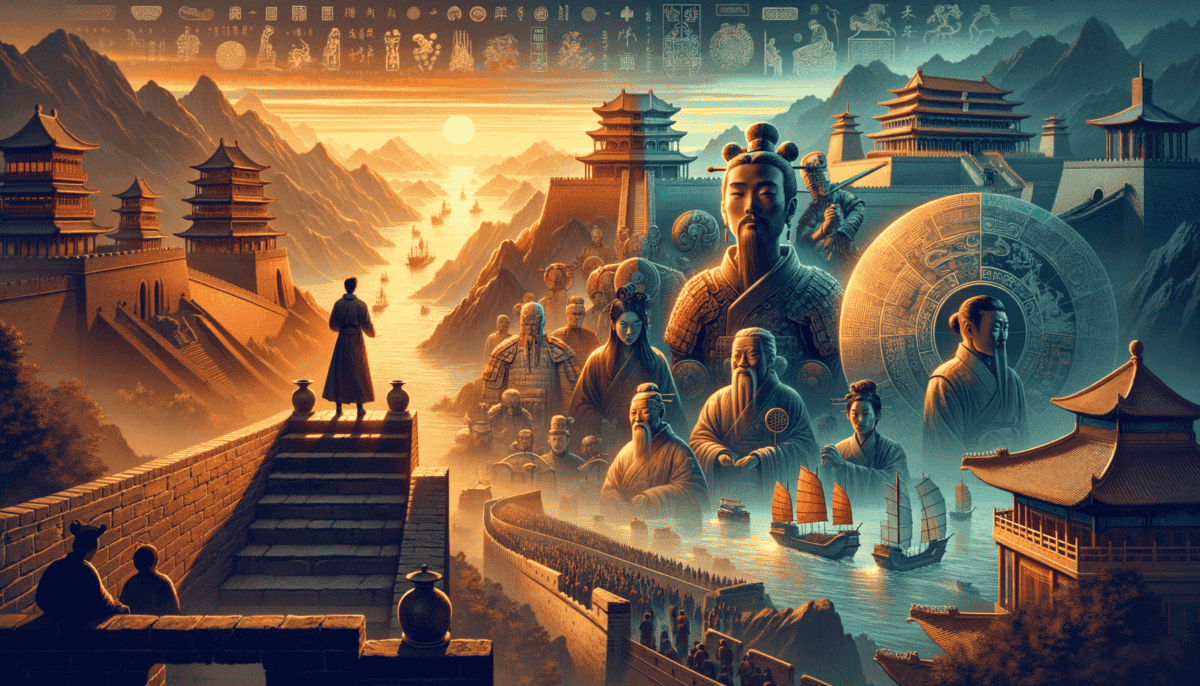The Time Traveler’s First Jump
Li Wei clutched her golden pendant tightly as the world spun around her. Bright lights flashed, and suddenly she found herself standing in ancient China, over 2,000 years ago!
The young historian blinked, taking in the bustling scene before her. Thousands of workers moved like ants across a vast construction site. The year was 221 BCE, and she had arrived just as Emperor Qin Shi Huang was building his massive empire.
"Amazing!" Li Wei whispered, straightening her special time-traveling clothes that helped her blend in. The air smelled of earth and clay, and she could hear the sounds of countless people working.
The Great Builder
A tall man in royal yellow robes stood nearby, pointing at various places where workers were building. This was Emperor Qin himself! Li Wei moved closer to listen.
"The walls must be connected!" the Emperor commanded. "From east to west, we will build the greatest wall ever known. It will protect our unified China!"
Li Wei knew she was watching history happen – this would become the early Great Wall of China.
“One empire, one writing system, one set of rules!” Emperor Qin declared to his advisors. “No more fighting between different kingdoms. We are all one China now!”
The Clay Warriors
Following the crowd, Li Wei came upon another amazing sight. Hundreds of craftsmen were carefully making life-sized clay soldiers. Each warrior had a different face!
"These soldiers will protect our Emperor even after death," an old craftsman told her proudly. "We're making thousands of them for his tomb."
Li Wei watched in wonder as they painted the terra-cotta warriors in bright colors. She knew these same statues would be discovered thousands of years later.
A New Beginning
Walking through the busy streets, Li Wei saw other big changes happening:
• Everything was becoming more organized and similar across the empire:
- The writing system
- The money people used
- The way roads were built
- How weights and measures worked
"Before Emperor Qin, every kingdom had different ways of doing things," a merchant explained to her. "Now it's much easier to trade and travel!"
The Price of Unity
But not everyone was happy. Li Wei heard whispers in the streets about the hard work and strict rules. Many people had to leave their homes to build the wall or the Emperor's tomb.
"The Emperor is harsh," one worker said quietly, "but China is finally united. No more terrible wars between kingdoms."
Li Wei understood – big changes often came with both good and bad effects. As the sun set over the busy capital, she touched her pendant again, ready for her next time jump. The Qin Dynasty had started something huge – the story of imperial China was just beginning.
She had witnessed the birth of a unified empire, but there was still so much more to see. As the familiar lights began to swirl around her, Li Wei wondered what amazing sights awaited her in the next dynasty.
The Golden Age Begins
Li Wei’s head stopped spinning as the bright lights faded. She found herself standing in a completely different world. The streets buzzed with life, filled with people wearing colorful silk robes. Welcome to Chang’an – the greatest city in the world during the Tang Dynasty!
A City of Wonders
“Look at all the different kinds of people!” Li Wei gasped. She saw merchants from Persia, monks from India, and traders from Arabia walking the wide streets. Chang’an was like no other city she had ever seen.
“This is where all the Silk Road traders meet,” a friendly street vendor told her. “You can find treasures from every corner of the world here!”
The air was filled with sweet smells from food stalls selling dumplings, noodles, and exotic spices. Music floated through the air – both Chinese instruments and strange new sounds from far-away lands.
Poetry in the Garden
Following the sound of laughter, Li Wei discovered a beautiful garden where poets were sharing their new works. A famous poet named Li Bai was reading:
Alone in the spring garden,
The spring wind tells me
I am not alone.”
Everyone clapped. Li Wei learned that poetry was very popular during the Tang Dynasty. Even regular people wrote poems!
New Ideas, New Beliefs
Walking through the city, Li Wei saw many temples and religious buildings. Some were for Buddhism, others for Taoism, and still others for different beliefs.
“In Chang’an, we welcome all ways of thinking,” explained a young monk. “People come here to learn and share ideas from all over the world.”
Art and Learning
Li Wei visited a workshop where artists were making beautiful things:
• They were creating:
- Colorful paintings on silk
- Shiny pottery with rainbow colors
- Tiny detailed carvings
- Beautiful writing with special brushes
“The Emperor loves art and learning,” said an artist as she painted delicate flowers. “He gives money to artists and writers to make beautiful things.”
A Time of Peace
The sun was setting over Chang’an’s grand buildings. Li Wei saw how different this was from the strict Qin Dynasty. The Tang Dynasty was a time when China was strong enough to enjoy peace and make beautiful things.
“This truly is a golden age,” she thought, watching dancers perform in the street. People seemed happy and free to try new things.
But even as she enjoyed the sights and sounds of Chang’an, Li Wei felt her pendant growing warm. Time was moving forward, and new wonders awaited her in the next dynasty. She smiled, knowing that Chinese civilization was growing in exciting ways.
Age of Innovation
The familiar tingling sensation washed over Li Wei as she materialized in a bustling city street. She had arrived in Kaifeng, the magnificent capital of the Song Dynasty. The air hummed with energy and excitement.
A City of Clever Minds
Li Wei’s eyes widened at the sight before her. Unlike the grand palaces of Chang’an, Kaifeng was filled with workshops and busy markets. Everywhere she looked, people were making new things!
“Come see the latest invention!” called out a merchant. “This compass always points north – perfect for every sailor!”
She watched as crowds gathered around his stand, amazed by the small metal needle that moved on its own.
Boom and Bang!
“What was that noise?” Li Wei jumped at a loud pop from nearby. Following the sound, she found herself at a weapons testing ground.
“That’s our newest creation – gunpowder!” explained a proud inventor. “It started as medicine, but look what it can do now!”
Books for Everyone
Walking through the city, Li Wei noticed many shops selling books. That was new! In earlier times, books were very rare and expensive.
“We use wooden blocks with writing carved on them,” a printer showed her. “We can make many copies of the same book very fast!”
People walked by carrying scrolls and books. Li Wei learned that more people could read now than ever before.
Smart Students
Near the city center, Li Wei found a big school. Hundreds of students were studying hard for special tests.
“If you pass the imperial exam, you can work for the government,” a student told her. “It doesn’t matter if your family is rich or poor – anyone who studies hard can succeed!”
Money and Trade
The marketplace was different from anything Li Wei had seen before. Instead of trading things, people used paper money!
• Paper money
• Movable type printing
• Magnetic compass
• New ways to use gunpowder
• Better ways to farm
Big ships filled with silk, tea, and pottery left the harbors. Smaller boats carried goods on rivers and canals throughout China. The Song Dynasty was getting rich from all this trade!
Looking to the Stars
As night fell, Li Wei visited a tall tower where scientists watched the stars. They had special tools to study the sky and track time.
“We’re making maps of the stars,” said an astronomer. “We want to understand everything about our world!”
Li Wei smiled as her pendant began to warm up again. The Song Dynasty showed her that Chinese people were very clever inventors. They found new ways to do things that would help people for hundreds of years to come. ⭐
Empire Without Borders
Li Wei’s pendant glowed warmly as she arrived in a new time. The air felt different – crisp and cool. She found herself standing in a vast grassland stretching as far as she could see.
The Great Khan’s City
“Welcome to Xanadu!” a friendly merchant called out. Li Wei gasped. She had landed in Kublai Khan’s summer capital during the Yuan Dynasty!
The city was unlike anything she had seen before. Round tents called gers sat next to Chinese-style buildings. People from all over the world walked the streets.
“Our empire stretches from Korea to Europe,” a proud guard told her. “The Great Khan welcomes everyone who brings new ideas!”
A World Connected
In the marketplace, Li Wei saw amazing things from far-away places:
• Persian carpets
• Indian spices
• European glass
• African ivory
• Arabian horses
“The Silk Road has never been safer,” a trader explained. “The Mongols keep the roads clear of bandits. Now we can trade with anyone!”
Meeting Marco Polo
Li Wei spotted a tall man with light hair writing in a book. It was Marco Polo from Venice! He had come all the way from Italy to see China.
“Your country is amazing,” Marco told her. “I’m writing everything down so people back home will believe me!”
Smart Ways to Rule
At the palace, Li Wei watched Kublai Khan talk to his advisors. He wore both Mongol and Chinese clothes.
“We must learn from all our people,” the Khan said. “Use Chinese writing for messages, Muslim science for medicine, and Mongol horses for mail delivery.”
New Ideas Everywhere
Li Wei visited a hospital where doctors from China, Persia, and India worked together. They shared their knowledge about healing.
In workshops, Chinese painters learned new ways to draw from Persian artists. Persian weavers learned about Chinese silk. Everyone was learning from each other!
Paper Money Goes Global
“Look at this!” a merchant showed Li Wei. “Paper money from the Song Dynasty was so clever, we use it everywhere now. It’s much easier than carrying heavy coins!”
Li Wei smiled. The Yuan Dynasty had taken good ideas from everywhere and made them even better.
Time to Move On
As her pendant began to warm up, Li Wei took one last look at Xanadu. The Mongols had built something special – a world where people from everywhere could meet, trade, and share ideas. Their huge empire helped make the world feel smaller and more connected.
Wonders of the Ming
Li Wei’s pendant transported her to a bustling street in Beijing. The air was filled with excitement as thousands of workers hurried past, carrying tools and materials. ️
The Greatest Palace
“Watch where you’re going!” a worker called out as he carried red paint. “We must finish the Forbidden City today. The Emperor moves in tomorrow!”
Li Wei looked up in wonder. The massive palace complex stretched before her, its golden roofs gleaming in the sun. Everything was painted in bright red and gold.
“This will be the biggest palace in the world,” a proud architect told her. “It has 9,999 rooms – one less than heaven!”
Adventures at Sea
At the port of Nanjing, Li Wei saw something amazing – huge wooden ships bigger than anything she’d ever seen before. These were the treasure ships of Admiral Zheng He!
“Our ships are nine-masted giants,” a sailor bragged. “They can carry 500 people each. We’ve sailed to Africa and Arabia!”
• Visited 37 countries
• Had 300 ships
• Brought back giraffes
• Traded Chinese silk and tea
• Made friends with foreign kings
Art and Beauty
In a workshop, Li Wei watched skilled craftsmen making blue and white porcelain vases. People all over the world wanted these beautiful Ming vases.
“See how carefully we paint each flower?” an artist showed her. “Our porcelain is the finest in the world. Even far-away kings collect it!”
Building the Wall
Li Wei traveled north to see workers rebuilding the Great Wall. They used strong bricks instead of earth, making it stronger than ever.
“This wall will protect us forever,” a guard said proudly. “It’s so big, you can see it from the moon!”
Friends Far Away
At court, Li Wei watched as visitors from other lands brought gifts to the Emperor. There were people from Korea, Japan, and even Europe!
“The Ming Dynasty trades with everyone,” explained a court official. “But they must respect our Emperor as the greatest ruler under heaven.”
Signs of Change
But Li Wei noticed something worrying. While Ming China was very proud, other countries were getting stronger. New weapons and ships were being made in Europe.
“We don’t need foreign things,” a minister said. “China has everything we need right here.”
Li Wei wondered if staying closed off from the world was a good idea. As her pendant began to glow, she thought about how the world was changing. Would the mighty Ming Dynasty be ready for what was coming next?
Change and Challenge
Li Wei appeared in a beautiful garden filled with peonies and lotus flowers. She was in the Summer Palace, where the Qing emperors lived during hot weather.
A New Dynasty
“Our Manchu warriors conquered China!” a proud guard told her. “Now we rule the biggest empire ever!”
Li Wei watched ladies in fancy Manchu dresses walk by. They wore their hair in special styles with platforms on their shoes. Everything looked rich and grand.
• All of China
• Mongolia
• Tibet
• Parts of Russia
• Taiwan
Strange Ships
At the port of Canton, Li Wei saw something new – big foreign ships with tall masts and metal sides. They came from Britain and other European countries.
“They want to trade,” a merchant said. “But they only have silver to give us. We don’t need their other goods.”
The foreign traders looked frustrated. “Why won’t China trade freely with us?” one complained. “They only let us use one port!”
The Opium Problem
Li Wei noticed people smoking something in dark rooms. They looked sick and tired. This was opium that foreign traders brought to China.
“This drug is destroying our people,” a worried doctor said. “But when we try to stop it, the foreign powers get angry.”
New Ways and Old
In Beijing, Li Wei saw soldiers practicing with old-style bows while foreign armies had new guns. The world was changing fast, but China was trying to stay the same.
“We don’t need foreign machines,” a court official insisted. “Chinese ways are best!”
The Last Days
Li Wei watched sad scenes unfold. Foreign armies with modern weapons forced China to trade. Parts of China came under foreign control. The proud empire was weakening.
In 1912, the last emperor – a little boy named Puyi – had to leave the Forbidden City. China’s 2,000 years of imperial rule were over.
Journey’s End
As her pendant glowed one final time, Li Wei thought about everything she had seen. From the first emperor’s great unification to the Tang’s golden age, the Song’s inventions, the Yuan’s vast empire, the Ming’s glory, and now the Qing’s challenges.
“China’s empire may be gone,” she realized, “but its amazing culture and achievements live on. And China will find new ways to be great!”
Back in her own time, Li Wei smiled as she touched her pendant. Her journey through China’s imperial dynasties had shown her how civilizations rise and fall, but also how their legacy continues to shape our world today.
The story of China’s empires teaches us that change is natural, and that we must learn from the past while being ready for the future.


